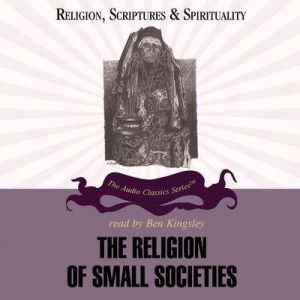
List: $11.95
| Sale: $8.36
Club: $5.97
The Religion of Small Societies
Author: Dr. Ninian Smart
Narrator: Ben Kingsley
Unabridged: 2 hr 53 min
Format: Digital Audiobook Download
Publisher: Knowledge Products, Inc.
Published: 03/30/2006
Category: Religion
Synopsis
Small societies are the surviving peoples of ancient, indigenous cultures that now exist in and around modern nationstates; Eskimos, Lapps, the Dayak people of Borneo (Indonesia), and the Ainu people of northern Japan are just a few examples. Typically these are tribes of hunters, gatherers, or perhaps agricultural or pastoral peoples; most of humanity once lived in ways that resemble the ways of todays small societies. Though indigenous cultures produce little significant writing or literature, their spiritual experience is often profound. Everpresent spiritual powers are believed to manifest themselves throughout the natural world: modern scholars call this outlook animism. A hierarchy of spirits of gods culminates in a High God, who is often remote and ineffable, barely connected to everyday human experience. Ancestors are believed to exist still as the living dead; totemism identifies a clan with some specially related natural object or species. The shaman is a king of prophet able to undergo spiritual experiences and visions, using spiritual methods to heal the sick and functioning much like a priest, magician, and psychic. Indigenous peoples attempt to appease the gods with sacrifices; here an object or being is often burned so that its unseen essence or spirit is sent upwards to the gods. Magic (often using such familiar religious vehicles as omens, spells, oracles, etc.) is believed to manipulate the secret powers in the universe; it is relied upon especially when outcomes are unpredictable and the emotional consequences are significant. Taboos help organize society by prohibiting certain behaviors. Rights of passage promote social stability and order by formalizing such events as birth, puberty, marriage, and death. Rituals (especially fertility rituals) also express the societys beliefs and commitments in a formal, structured way. And myths relate human beings to their surrounding world. Many indigenous cultures have been consumed by colonial empires and nationstates; survivors are confronted by scientific methods and values that destroy their traditional beliefs. These peoples have been traumatized by loss of land, new diseases, technology, and warfare. Ideals and expectations change slowly though many small societies now have a growing selfconsciousness and a broader, more collective conception of their interests in the struggle to adapt traditional beliefs to modern realities.